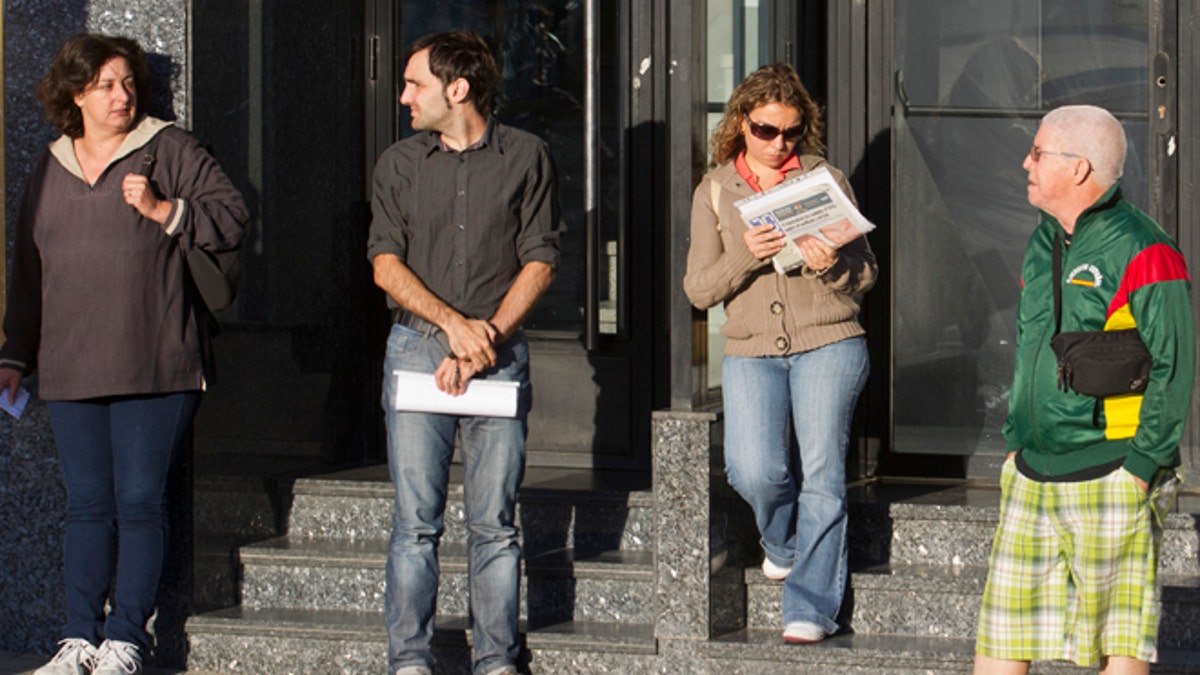
A woman reads a newspaper with the headline ' Public transport tickets have gone up 31 per cent after the recent V.A.T. tax hike' in a queue outside an unemployment registry office in Madrid, Tuesday Sept. 4, 2012. Spain says the number of people registered unemployed and claiming benefits rose in August by 38,179 people compared to the previous month, the first increase in five months in a deepening recession. At the end of the second quarter Spain reached the European Unionâs highest unemployment rate at 24.6 percent, a new overall rate wonât be released until October. (AP Photo/Paul White) (AP2012)
MADRID – As it awaits a loan from its 16 partner countries in the eurozone, Spain plans to infuse another €6 billion ($7.5 billion) into its bank rescue fund to cope with growing problems in its financial sector.
An official with the Economy Ministry, speaking only on condition of anonymity because of government policy, confirmed the extra cash will raise the capital base of the bank rescue fund to €15 billion.
The fund needs the new money to make an emergency cash injection of €4.5 billion ($5.7 billion) into Bankia SA, the nationalized lender, by buying new shares.
Like many of Spain's banks, Bankia is saddled with huge amounts of soured real estate investments left over from the 2008 property market crash.
Bankia has asked for a total of €19 billion in public aid. The total amount that will be injected into Bankia should be made public in coming weeks after audits of Spain banks are completed, according to the fund for the orderly restructuring of banks, or FROB, the bank rescue fund set up to help Spain's financial sector.
Spain could finance the fresh injection of cash into the rescue fund by issuing bonds, but no decision has been made yet, the official said.
To manage the rising cost of helping its banks, Spain has formally asked for a loan from other eurozone countries of up to €100 billion. The government expects to get the loan by early November, once the banks' restructuring plans are unveiled in the middle of this month.
Meanwhile, the economy is in a deep recession and is expected to recover only gradually.
The government said Tuesday that the number of people claiming unemployment benefits in Spain rose by 38,179 in August from the previous month to a total of 4,625,634.
Employment Ministry spokeswoman Engracia Hidalgo said although the monthly rise in unemployment was bad news, the increase was the smallest since August 2006.
Unemployment among young people under the age of 25 — one of the brackets hardest hit by the recession — fell by 4,060, a 0.9 percent dip from the previous month.
About half of young people remain without a job, however, underscoring the extent of the country's economic difficulties. Spain also has the European Union's highest overall unemployment rate, at 24.6 percent as of the end of the second quarter.
The tough economic outlook and the financial difficulties of Spanish banks and regional governments have spooked investors, who have been asking for higher interest rates to lend to the government.
Markets fearful that Spain may not be able to reduce its swollen deficit have been charging high prices for the country's debt.
Spain's benchmark 10-year bond rate stood at an elevated 6.6 percent on Tuesday. It was even higher this summer, before the European Central Bank said it was considering a plan to buy government bonds from countries like Spain. ECB President Mario Draghi is expected to detail that plan on Thursday.
Also Thursday, German Chancellor Angela Merkel is due to visit Madrid for talks with Prime Minister Mariano Rajoy, where Spain's progress with austerity measures is likely to be high on the agenda.
"The government remains committed to pursue all necessary reforms to promote employment," said Hidalgo.
Based on reporting by the Associated Press.
Follow us on twitter.com/foxnewslatino
Like us at facebook.com/foxnewslatino
